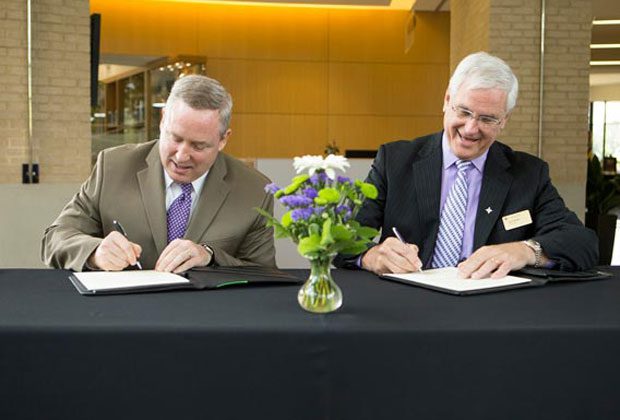Creating a student pipeline to health-related careers

GREENVILLE, S.C.—Furman University and Greenville Health System (GHS) announced today they have entered into a new academic partnership that will allow Furman to develop innovative programs for undergraduate students interested in health-related careers and provide them with an array of hands-on experiences at one of the Southeast’s largest health systems.
As part of the agreement, Furman will be GHS’ primary undergraduate partner, providing its faculty and students, as well as those of other colleges in the area, with distinctive opportunities to study and work with healthcare professionals at GHS in both clinical and non-clinical settings.
“This is an exciting opportunity for Furman and its students,” said interim president Carl Kohrt, Ph.D. “Right now, approximately 25 percent of Furman students have shown an interest in a health career, including 35 percent of this year’s freshman class. Health care is the nation’s largest industry and it continues to grow; this presents an opportunity to strengthen Furman’s value proposition through a partnership with GHS that has existed for more than two decades.”
Furman is the third primary education partner to align with GHS within the past year in what is emerging as a groundbreaking effort to build the healthcare workforce pipeline through alliances among health care systems and academic institutions. The other partners are the University of South Carolina, which is GHS’ primary medical education partner through the USC School of Medicine Greenville, and Clemson University, which serves as the primary research partner.
Kohrt made it clear that Furman’s involvement in the GHS partnership will benefit more than Furman students, saying the program will eventually offer undergraduates at other area colleges and universities an opportunity to become involved in the various initiatives created through the partnership.
John Beckford, D.M., Furman’s vice president for academic affairs and dean, said those initiatives for students will include both clinical and non-clinical experiences at GHS.
“As a liberal arts and sciences university, Furman prepares students to be leaders in a wide range of fields,” Beckford said. “This partnership will further strengthen that goal, providing observational and internship experiences for students considering careers in medicine, pharmacy, and physical and occupational therapy, as well as non-clinical opportunities in public health, health administration, public relations, marketing and information technology.”
According to GHS president and CEO Michael Riordan, the partnership is well-aligned with the GHS mission to heal compassionately, teach innovatively and improve constantly. “This is another example of an academic partnership that will develop local talent and also attract the best and brightest to the Upstate. Our patients will benefit, our community will benefit and so will our economy.”
Nearly half of the fastest growing jobs through 2020 are projected to be in health care, according to the U.S. Bureau of Labor Statistics. Health care, despite its uncertainties and changes, is the nation’s only trillion-dollar industry, with the current estimate at $2 trillion.
The working relationship between Furman and GHS over the past 20 years has produced 10 formal collaborative programs as well as extensive, shared community outreach projects. The current programs in the partnership include courses in medical ethics, internships in psychology and health science, student participation in Medical Experience Academy, and a student observation program.
“GHS believes that health care of the future will need a different type of workforce as the industry evolves,” Riordan said. “We need to be more purposeful about our pipelines into health care. Students will need to be better prepared and need more diverse backgrounds. This initiative supports that goal. GHS is already helping to redefine and develop that new vision of health care, but it’s critical that we work with outstanding academic institutions like Furman University to get it right.”
“Just as GHS is a model of change, so, too, this could be a model for change at a national level. This pipeline approach for health professional education and practice is a proactive and innovative approach for the future,” Riordan said. “This public/private model demonstrates the value of an intentional integrated approach that features the best of academics and practical applications.”
GHS officials said Furman’s involvement will not only give its graduates additional skill sets to make them even more attractive in the job market, but their involvement may also flavor and change the direction of healthcare education at GHS itself.
“Furman students will bring a broad liberal arts vision and human-centered approach to healthcare, which will be invaluable as we move forward toward a healthcare approach that’s integrated as never before, with technological advances complemented by humane and ‘high-touch’ patient care,” said Spence Taylor, M.D., vice president of academics at GHS.
In the summer of 2011, GHS launched the Medical Experience (MedEx) Academy pipeline program for undergraduate students. Furman was the first undergraduate institution to participate in the new and innovative program with 12 students enrolled.
The new partnership builds on this collaboration and provides opportunities for Furman to have a key role in expanding this highly regarded pipeline program to national prominence, said Brenda Thames, vice president for academic development at GHS. She said strategic efforts will deepen the work force development pipeline’s outreach into local schools but also help better connect it to collegiate and post-collegiate healthcare education programs nationwide. The model could also be used by businesses and industries interested in establishing their own niche-specific pipelines.
“The pipelines need to be connected,” Thames said, “and Furman understands the importance of creating learning experiences outside the classroom. Instead of doing only coursework their first years, undergraduates can get involved in healthcare observation right away and that would also hold true for early clinical experiences for students at the professional school level. By working together, we can make the process much more efficient and get healthcare students well-prepared for the work challenges to come.”